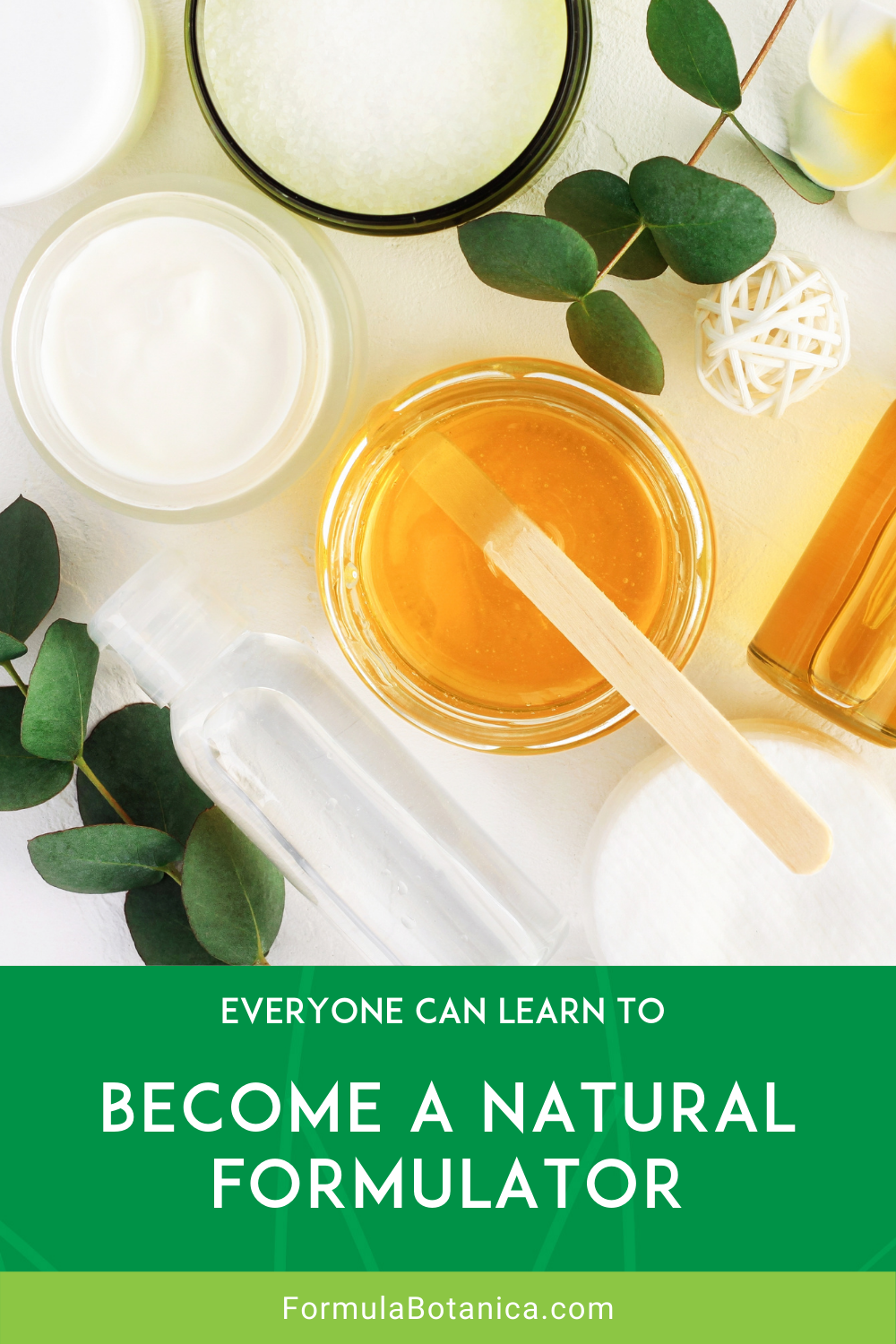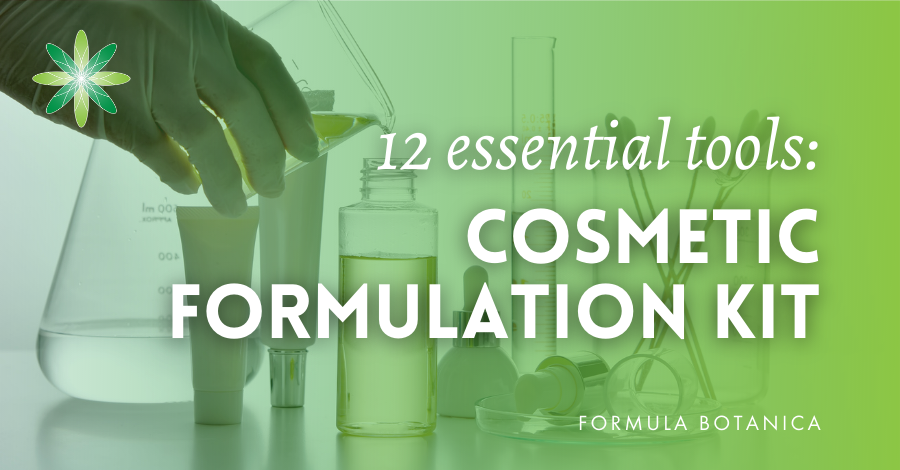The chances are if you’re reading the Formula Botanica blog that you’ve decided you would like to become a formulator. You’ve undoubtedly noticed that formulation is having a resurgence as people across the world have realised that they can empower themselves with a skill that’s been around since the dawn of time.
After all, everyone can formulate. Everyone can work with organic, cold-pressed plant oils, freshly distilled flower waters, exotic botanical butters, high-performance plant extracts and exquisitely fragrant essential oils. Since our virtual doors opened in 2012, Formula Botanica has seen over 13,000 students go through our award-winning online courses and empower themselves with the skills to make their own botanical lotions, serums, shampoos, conditioners and cleansers.
But in that time, I’ve also seen people feel hesitant and think that they don’t have what it takes.
I’m going to dispel some of those myths in this post and give you the top 5 facts you need to know before you become a formulator.
1. You don’t need to be a chemist to formulate
This is probably the biggest myth I’ve heard over the years. Formula Botanica receives over 1,000 messages a week by email, DM, phone or chat and many of those messages are from people who ask if they can enrol for our online courses even if they haven’t got a chemistry degree.
I’m here to tell you right now that you don’t need to be a chemist to make your own emulsions, masks and scrubs.
This is a myth that’s been created by the mainstream beauty industry and dates back many decades when the first beauty pioneers started wearing white lab coats in their marketing materials. Have you ever walked through a department store and seen sales reps on the beauty counters wearing white lab coats? Exactly. The messaging is subtle, but powerful.
In order to become a formulator, you need to be able to:
- Safely create a formulation from scratch.
- Understand the way that your ingredients work together.
- Set up a safe and hygienic working space.
- Learn how to comply with the cosmetics regulations in your country.
All of these steps can be learned easily with the right education – such as Formula Botanica’s award-winning online courses.
Listen to our podcast: You don’t need to be a chemist to be a formulator
2. You don’t need to buy lots of expensive equipment
It’s easy to fall into the trap of thinking you need to invest in pricey homogenisers or overhead stirrers as soon as you start formulating, but I promise you that you don’t.
In fact, when our students first enrol with us, we recommend they keep it incredibly simple and just buy a few simple tools such as a couple of glass beakers, a few glass rods, some simple jewellery scales and a mini whisk. You need to learn to walk before you can run and we certainly don’t want you to make a large upfront investment before you’ve made your first formulations.
I often give the example of a student who told me that she wanted to buy a big homogeniser and launch a brand selling emulsions after she’d completed our Diploma in Organic Skincare Formulation. I encouraged her to wait before buying any major equipment. She came back to me a year later and told me she was so grateful because she’d decided instead to launch a range of facial oils after completing our foundation Diploma.
To make your life easier, we’ve prepared a list of equipment we recommend you start with when you enrol with Formula Botanica.
Watch our tutors explain: The Beginner’s Guide to Setting Up a Home Formulation Lab
View this post on Instagram
3. Buying botanical ingredients becomes addictive
One of the main questions we’re asked is: “How much does a student typically spend on ingredients when working through their Formula Botanica courses?“.
Typically, we encourage students to budget half of their course fees in ingredients, but I’m going to be honest with you… buying botanical ingredients becomes addictive.
We’ve all been there. You go onto a supplier’s website to look for a hydrosol and then find yourself wondering what all of the others in the shop smell like and how they could make your formulation better. Before you know it, your basket is full of ingredients and you’re buzzing with excitement as you wait for them to arrive.
Most of us become formulators because we’re so excited at the idea of working with leaves, herbs, roots, petals, flowers, buds, stems, barks, seeds and oils in our botanical home labs. And truthfully, this is the best part of becoming a formulator.
Everyone can formulate! @Formula Botanica dispels the myths about entering the exciting world of natural cosmetic formulation. #naturalcosmetics #naturalformulation #skincarecourses Share on XBecome inspired: Explore the dozens of ingredients’ posts in our extensive blog
4. You’ll never need shop-bought beauty products again
This is possibly the biggest surprise for most new formulators, once they get started.
- Need a new lip balm? You can now formulate one.
- Need a new cleanser? You can now formulate one.
- Need a new shampoo? You can now formulate one.
All of a sudden, you can make yourself a beauty formulation shopping list. And rather than heading out to the local shops, you can just dive into your home formulation lab and start mixing up your own version to cater for your skin or hair care needs.
View this post on Instagram
5. You won’t believe how empowered you’ll feel
Following on from my last point, imagine how you’ll feel being able to make your own skincare or haircare formulations using botanical ingredients. You are in control. You no longer need to rely on the beauty counters of major department stores or supermarkets.
After all, you’re a formulator now and can whip up your own batch of any serum, toner or micellar water. You’ll find yourself reading labels in the shops and thinking “hmm, I could make that myself, but I could replace all of these synthetic ingredients with natural alternatives”.
Formulation is fun, it’s easy and it’s empowering. And everyone can do it.
Make sure you don’t miss enrolment for Formula Botanica’s next term time by pre-enrolling now for our Diploma in Organic Skincare Formulation and committing to become a formulator. I’ll see you soon in our community.
FREE TRAINING
Learn how to become an
Organic Skincare Formulator
FREE TRAINING
How to become an
Organic Skincare Entrepreneur
FREE TRAINING
How to become an
Organic Skincare Entrepreneur
Leave us a comment
Lorraine Dallmeier is a Biologist, Chartered Environmentalist and the CEO of Formula Botanica, the award-winning online organic cosmetic science school. Read more about Lorraine and the Formula Botanica Team.




























